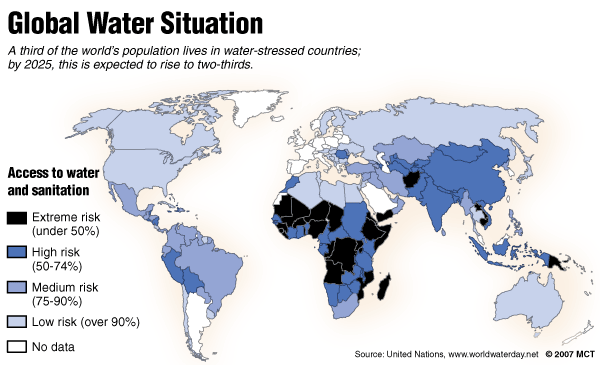
World News Desk
Learn the why behind the headlines.
Subscribe to the Real Truth for FREE news and analysis.
Subscribe NowOf the estimated 6.7 billion people on earth, 2.6 billion—more than one third—“live without access to even a toilet at home and thus are vulnerable to a range of health risks,” according to a preliminary report by the United Nations Children’s Fund (UNICEF).
The lack of access to proper sanitation, including clean water, “is a major cause of diarrhea, the second biggest killer of children in developing countries, and leads to other major diseases such as cholera, schistosomiasis, and trachoma,” the report said.
Africa’s situation is the most dire: more than 60% of Africans do not have access to a toilet—and in Central Africa alone, unclean water threatens the health of one million people.
Dr. Margaret Chan, the Director-General for the World Health Organization said that “sanitation is a cornerstone of public health.”
“Improved sanitation contributes enormously to human health and well being,” she said in a statement. “We know that simple, achievable interventions reduce the risk of contracting diarrheal disease by a third. Sanitation matters because a toilet at home spares a family from illness, health care expenses, and time lost from work and school.”
War torn nations are most at risk.
According to sanitation reports compiled from several relief agencies by the UN News Service, “the situation was worst in the northeast of the Central African Republic (CAR), where fighting between Government forces and rebels and attacks by local bandits have forced thousands of people out of their villages to seek shelter in the nearby bush.
“The insecurity is so widespread across the north of the country that many Central Africans there are too afraid to return to their villages, instead resorting to stagnant pools or rivers in the bush areas for their water supplies. Those that have remained in their villages often face wells that are not working.”
The situation is the same for Afghanistan, which has suffered from war for decades.
In 2007, Afghanistan was ranked as the worst place in the world for sanitation in the “State of the World’s Toilets” report—92% of the country’s 26.6 million people lacked proper toilet facilities.
UNICEF reported that “preventable diseases such as diarrhea, cholera, dysentery and pneumonia kill about 600 under-five Afghan children every day” and “about 25 percent of under-five children in Afghanistan are affected annually by disease originating from poor and/or bad sanitation.”
Not only does poor sanitation result in health problems and death, it has economic implications for a country.
“Improved sanitation increases primary school enrollment, reduces illnesses so children miss fewer school days, increases productivity among adults, provides safety to women, and reduces the pollution of water resources,” according to a statement by The World Bank Group.
“The costs of environmental and health degradation due to inadequate water and sanitation services have been estimated at more than 1 percent of GDP in Colombia, 0.6 percent in Tunisia, and 1.4 percent in Bangladesh.”
In addition, the report quoted a study by the Water and Sanitation Program, which maintained that “poor sanitation is responsible for at least $9 billion in economic losses per year in Cambodia, Indonesia, the Philippines and Vietnam combined.”
The same report also said that approximately 1.7 million deaths worldwide per year are due to unsafe water, poor sanitation and hygiene, primarily through infectious diarrhea.
UN Secretary-General Ban Ki-moon said that a lack of political will was the biggest obstacle to improving sanitary conditions around the world. “Every dollar invested in water and sanitation yields an estimated seven dollars worth of productive activity. And that comes on top of the immeasurable gains in cutting poverty, improving health and raising living standards.”
Even in nations considered more economically developed, safe drinking water and proper sanitation is a problem.
According to the UN Economic Commission for Europe, “…over 100 million Europeans still do not have access to safe drinking water.” Of the 56 countries in the pan-European region, “37 children die of diarrhea each day due to the lack of access to safe water.”
In addition, the commission said, “The incidence of infectious diseases caused by poor-quality drinking water is often highest in children aged 6 to 11 months. More than 170,000 cases of water-related disease were reported in 2006, including over 120,000 cases of viral hepatitis A.
“The spread of water-transmitted diseases is especially common in Eastern Europe, where 16 percent of the population still do not have access to drinking water in their homes. The situation is even more severe in rural areas, where more than half of the population lacks a reliable supply of safe water and/or adequate sanitation systems.”
An editorial in The East African Standard, a daily newspaper in Nairobi, highlighted the problem: “Each year, the UN reports, poor sanitation and unsafe water claim the lives of 1.5 million children. Humankind’s biggest hurdle remains the deplorable failure to turn around the lives of the 2.6 billion people—half the population of the developing world—that has no access to basic sanitation.”
The editorial later added, “It is appalling that what could be the simplest of global problems has turned out the hardest.”
- Real Truth Magazine Articles
- SOCIETY & LIFESTYLES
 The State of Poverty: America, the World—and the World to Come!
The State of Poverty: America, the World—and the World to Come!
More on Related Topics:
- Drive to End Global Hunger Has Stalled, UN Warns
- Deceit and Desperation: The Rise of Medical Conspiracies
- Dengue Cases in Americas Surpass Last Year’s Record High, WHO Says
- Older Americans Often Do Not Prepare for Long-term Care
- Obesity and High Blood Sugar Play Ever-growing Role in Ill Health, Study Shows


